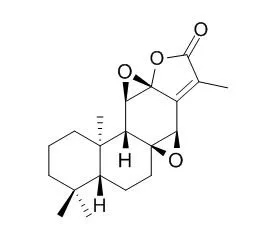| Kinase Assay: |
| Int J Clin Pharmacol Ther. 2013 Mar;51(3):170-8. | | Jolkinolide B from Euphorbia fischeriana Steud induces in human leukemic cells apoptosis via JAK2/STAT3 pathways.[Pubmed: 23253949] | Jolkinolide B from the roots of Euphorbia fischeriana Steud exhibits significant antitumor activities against several tumor lines. Previous study has shown that Jolkinolide B could induce apoptosis in human leukemia cells. However, the exact mechanism and signaling pathway involved in Jolkinolide B-induced apoptosis have not been fully elucidated.
METHODS AND RESULTS:
In the present study, we found that Jolkinolide B reduced cell viability and induced apoptosis in dose- and time-dependent manner in human leukemic HL-60 and THP-1 cells. The induction of apoptosis was accompanied by the downregulation of JAK2/STAT3. Our results also suggest that expression of Bcl-2 and mitochondrial cytochrome c was dosedependently reduced following Jolkinolide B-treated THP-1 and HL-60 cells, whereas Jolkinolide B up-regulated the expression of Bax and cytosolic cytochrome c. Moreover, we observed that Jolkinolide B treatment resulted in activation of caspase-3, -8, and -9. JSI-124, a STAT-3 inhibitor, was able to block the negative effect of Jolkinolide B on cell apoptosis.
CONCLUSIONS:
Taken together, our study for the first time suggests that Jolkinolide B is able to enhance apoptosis of human leukemic HL-60 and THP-1 cells, at least in part, through downregulation of JAK2/STAT3 and bcl-2, and upregulation of Bax and cytosolic cytochrome c. Moreover, the triggering of caspase-3, -8, and -9 activation mediated apoptotic induction. | | Int Immunopharmacol. 2015 May;26(1):119-24. | | Protective effect of Jolkinolide B on LPS-induced mouse acute lung injury.[Pubmed: 25819665 ] | Jolkinolide B (JB), an ent-abietane diterpenoid, isolated from the dried root of Euphorbia fischeriana, has been reported to have potent anti-tumor and anti-inflammatory activities. However, the effects of Jolkinolide B on acute lung injury (ALI) and underlying molecular mechanisms have not been investigated.
METHODS AND RESULTS:
The present study aimed to investigate the effect of Jolkinolide B on lipopolysaccharide (LPS)-induced ALI. Male C57BL/6 mice were pretreated with dexamethasone or Jolkinolide B 1h before intranasal instillation of LPS. The results showed that Jolkinolide B markedly attenuated LPS-induced histological alterations, lung edema, inflammatory cell infiltration, myeloperoxidase (MPO) activity as well as the production of TNF-α, IL-6 and IL-1β. Furthermore, Jolkinolide B also significantly inhibited LPS-induced the degradation of IκBα and phosphorylation of NF-κB p65 and MAPK.
CONCLUSIONS:
Therefore, our study provides the first line of evidence that pretreatment of Jolkinolide B has a protective effect on LPS-induced ALI in mice. The anti-inflammatory mechanism of Jolkinolide B may be attributed to its suppression of NF-κB and MAPK activation. | | Oncol Rep. 2013 Jan;29(1):212-8. | | Jolkinolide B induces apoptosis in MCF-7 cells through inhibition of the PI3K/Akt/mTOR signaling pathway.[Pubmed: 23129237] | The aim of this study was to explore the molecular mechanisms of Jolkinolide B (JB), which is extracted from the root of Euphorbia fischeriana Steud.
METHODS AND RESULTS:
In this study, we found that Jolkinolide B, a diterpenoid from the traditional Chinese medicinal herb, strongly inhibited the PI3K/Akt/mTOR signaling pathway. Furthermore, we evaluated the effects of Jolkinolide B on the proliferation and apoptosis of MCF-7 human breast cancer cells. Our results showed significant induction of apoptosis in MCF-7 cells incubated with Jolkinolide B. The viability of the MCF-7 cells was assessed by MTT assay. Flow cytometry was used to detect apoptosis and cell cycle analysis. Transmission electron microscopy (TEM) analysis was used to observe cell morphology. MCF-7 cells were subcutaneously inoculated into nude mice to study the in vivo antitumor effects of Jolkinolide B. The growth of MCF-7 cells was inhibited and arrested in the S phase by Jolkinolide B. The data showed significantly decreased tumor volume and weight in nude mice inoculated with MCF-7 cells. In addition, treatment with Jolkinolide B was able to induce downregulation of cyclinD1, cyclinE, mTOR, p-PI3K and p-Akt, and upregulation of PTEN and p-eIF4E.
CONCLUSIONS:
Collectively,Jolkinolide B-induced apoptosis of MCF-7 cells occurs through the PI3K/Akt/mTOR signaling pathway. Furthermore, the PI3K/Akt signaling cascade plays a role in the induction of apoptosis in Jolkinolide B-treated cells. These observations suggest that Jolkinolide B may have therapeutic applications in the treatment of cancer. |
|






 Cell. 2018 Jan 11;172(1-2):249-261.e12. doi: 10.1016/j.cell.2017.12.019.IF=36.216(2019)
Cell. 2018 Jan 11;172(1-2):249-261.e12. doi: 10.1016/j.cell.2017.12.019.IF=36.216(2019) Cell Metab. 2020 Mar 3;31(3):534-548.e5. doi: 10.1016/j.cmet.2020.01.002.IF=22.415(2019)
Cell Metab. 2020 Mar 3;31(3):534-548.e5. doi: 10.1016/j.cmet.2020.01.002.IF=22.415(2019) Mol Cell. 2017 Nov 16;68(4):673-685.e6. doi: 10.1016/j.molcel.2017.10.022.IF=14.548(2019)
Mol Cell. 2017 Nov 16;68(4):673-685.e6. doi: 10.1016/j.molcel.2017.10.022.IF=14.548(2019)